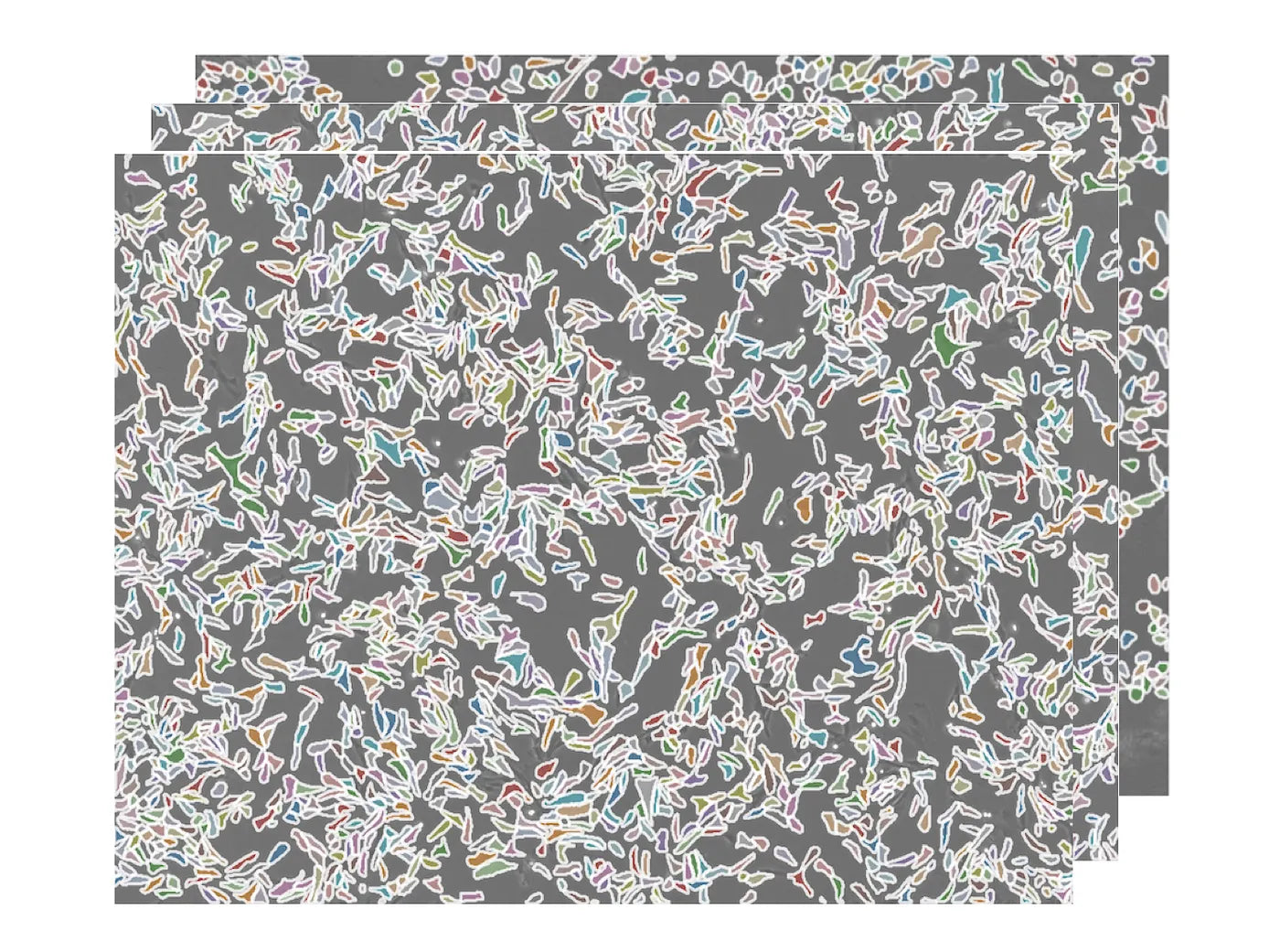Human pluripotent stem cells (hPSCs/iPSCs) underpin modern research in neuroscience, immuno-oncology, regenerative medicine, and emerging biomanufacturing fields. As these applications grow, researchers increasingly require defined, serum-free, and consistent media that support reliable expansion while remaining cost-accessible.
This blog provides a practical comparison of three widely used feeder-free, defined iPSC maintenance media:
- mTeSR™ Plus
- Essential 8™ Flex
- HiDef®-B8
We focus on formulation differences, performance expectations, workflow convenience, transparency, and scalability—helping labs evaluate which option best fits their scientific and operational needs.
Why Defined, Serum-Free iPSC Media Matters
The shift toward chemically defined and animal-component-free media reflects broader trends in stem cell research. Labs increasingly prioritize:
- Reproducibility across multi-line or multi-site studies
- Lot-to-lot consistency, minimizing variation
- Compatibility with translational workflows, including GMP considerations
- Cleaner backgrounds for downstream multi-omics and imaging
All three media compared here fall into the “defined iPSC maintenance” category, but each differs in cost, formulation, and practical workflow features.
1. Cost and Accessibility
To allow fair comparison, the prices below reflect a complete 500 mL medium, including both supplement and basal components when applicable.
- mTeSR™ Plus (500 mL): ~$407
- Essential 8™ Flex (500 mL): ~$430
- HiDef®-B8 Complete Media (500 mL equivalent): $190
HiDef-B8 is less than half the cost of two widely used alternatives.
For labs consuming multiple liters each month—for iPSC banking, organoid workflows, CRISPR screens, or early manufacturing—media costs accumulate quickly. A 5 L per-month operation totals:
- mTeSR™ Plus: ~$4,070/month
- Essential 8™ Flex: ~$4,300/month
- HiDef-B8: $1,900/month
At this scale, labs can save $25,000–$30,000 per year without sacrificing performance.
2. Composition and Formulation Differences
While all three products support feeder-free PSC maintenance, they differ in key formulation choices.
mTeSR™ Plus
- Widely used in academic labs
- Supports consistent maintenance and differentiation readiness
- Contains growth factors with typical stability considerations
Essential 8™ Flex
- Minimalist eight-component system
- Reduces variability through a simplified supplement scheme
- Uses growth factors with standard stability profiles
HiDef®-B8
- Based on a published, transparent, chemically defined formula
- Incorporates a thermostable FGF2 variant (FGF2-G3) for sustained activity
- Fully serum-free and animal-component-free
- Offered as a complete medium or supplement-only format
These formulation decisions affect weekend-free maintenance, colony morphology, and consistency over multi-day cycles.
3. Performance and Colony Morphology
Across internal tests and customer reports, the three media support highly comparable outcomes:
- Stable, compact hPSC/iPSC colonies
- Low spontaneous differentiation
- Predictable proliferation
- Expected expression of standard pluripotency markers (OCT4, TRA-1-60, SSEA-4, NANOG)*
*Expression varies by line, culture history, and handling.
HiDef-B8’s thermostable growth factor design helps maintain consistent colony morphology across longer feeding intervals.
4. Workflow Efficiency: Weekend-Free and Feeder-Free Culture
mTeSR™ Plus
- Typically used with daily feedings
- Not generally optimized for reduced-frequency maintenance
Essential 8™ Flex
- Offers more flexibility with extended feeding intervals
- Supports some forms of reduced-frequency maintenance
HiDef®-B8
- Supports weekend-free iPSC culture
- Designed for feeder-free workflows
- Available in a supplement-only format for labs preparing their own basal media
- Reduces hands-on time, especially in multi-line or core facility settings
Weekend-free capability becomes increasingly valuable for labs balancing staffing, scheduling, and reproducibility across teams.
5. Scalability for Modern Applications
Today’s iPSC media must perform consistently across a diverse set of applications. HiDef-B8 has been adopted in areas including:
- Neuroscience (neurons, neural progenitors, cortical organoids)
- Cardiac biology (iPSC-derived cardiomyocytes)
- Immuno-oncology (macrophages, NK cells, T-cell derivatives)
- Disease modeling & screening pipelines
- Cultured meat / cellular agriculture (supports bovine satellite cell growth in published collaborations)
While mTeSR™ Plus and Essential 8™ Flex are widely trusted for academic research, HiDef-B8 is increasingly selected for emerging industry workflows that require defined, animal-free, cost-efficient media at scale.
6. Transparency and Control in Media Composition
Researchers often want clarity in media formulations, especially when moving toward regulated or scalable workflows.
mTeSR™ Plus & Essential 8™ Flex
- Proprietary formulations
- Limited insight into component concentrations
HiDef®-B8
- Derived from an openly published, well-characterized formula
- Fully defined component list
- Manufactured for batch consistency and reproducibility
This transparency helps users understand how media components interact with differentiation protocols and downstream assays.
7. When Should a Lab Consider Switching?
HiDef-B8 may be a strong fit for labs that:
- Require defined, serum-free, animal-component-free iPSC media
- Run medium- to high-volume iPSC operations where cost matters
- Want weekend-free culture convenience and consistent multi-day colony quality
- Perform multi-omics assays, where undefined media can introduce background variability
- Need formulation transparency for regulated, translational, or manufacturing workflows
- Operate core facilities or multi-user environments that benefit from stable, lower-maintenance media
Most labs report a straightforward transition when switching from mTeSR™ or Essential 8™.
Our team has created an easy to follow transition guide that can be downloaded here.
Conclusion
mTeSR™ Plus, Essential 8™ Flex, and HiDef®-B8 are all reliable options for feeder-free iPSC maintenance. Each offers strengths depending on a lab’s priorities—workflow, stability, cost, or regulatory readiness.
HiDef®-B8 stands out through its:
- Fully defined, serum-free, and animal-component-free composition
- Use of thermostable FGF2-G3
- Weekend-free flexibility
- Transparent formulation
- Compatibility with a growing range of applications
- Significantly lower cost while supporting comparable colony morphology and pluripotency markers
For researchers seeking a cost-effective, defined, and scalable alternative to traditional iPSC media, HiDef-B8 offers a practical, high-performance option.



